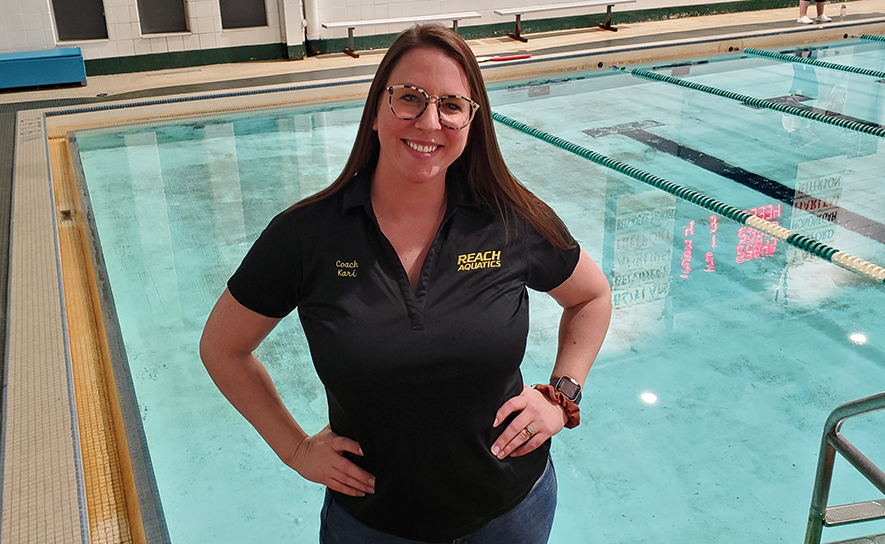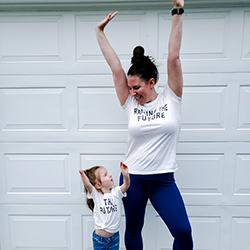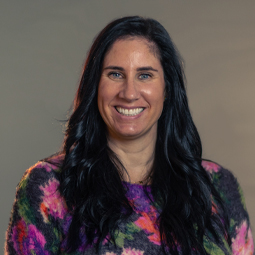USA Swimming News
Monday, March 13, 2023
Women’s History Month Moment: Kari Treat

Kari Treat, assistant coach with Reach Aquatics and Illinois Swimming DEI Committee member, shares her insight on the Women Coaches in Governance (WCIG) program and passion for helping athletes with disabilities.
Why did you join the WCIG program?
When I saw USA Swimming was offering the program, I wasn't going to let the opportunity pass me by. I knew it could connect with like-minded women across the country who are passionate about growing within the sport and learn from these people who have been in programs and have seen the good, bad and ugly. The experiences some of the speakers and participants shared really opened my eyes, motivated me to be more involved with our LSC, and find ways to make more opportunities and resources available to the athletes and non-athlete members.
Why should women be involved in governance?
Why is helping athletes with disabilities personal to you?
In high school, I volunteered with our local Special Recreation Association and took members to the pool. I loved helping the kids feel comfortable in the water, and seeing the joy on their faces when we'd jump in and splash around. In March of 2019, the coolest kid I know was born. My daughter, Mackenzie, arrived in our lives and surprised us with one hand and one "nubby" - her right arm stopped growing at the wrist, no hand or fingers. My "mom-mode" switched on and a flurry of research began. While I hadn't followed much of the Paralympics in the past, I started watching and following tons of athletes Mack would be able to see and be encouraged by. In the last (almost) four years, she has impressed us with everything she does, but my favorite is seeing her jump in the water and swim. In a few years, if she wants, I want to be able to get her classified to participate in some of the national, and maybe international events (mama's got big goals!). Illinois Swimming’s DEI Committee is committed to supporting all athletes, and I joined the committee in June of 2022. I love being able to join these two passions through engagement, research and networking. I had a chance to speak about supporting swimmers with disabilities to the fellow coaches at our Fall House of Delegates meeting, and I'm excited to provide more to the athletes and coaches in the future!
How can we help grow inclusivity in our sport for athletes with disabilities?
Education is key to supporting and growing opportunities for athletes with disabilities. Coaches can do a great job getting someone in the water and working with them to develop their strengths and understanding their limitations. Officials are trained in Article 105, but coaches should take advantage as well. Education can help them understand the process of having an athlete with a disability compete at a meet; doing things such as notifying the meet director and official of their athlete’s needs, what kind of accommodations can be requested and other ways to support. The "Creating Safe and Inclusive Environments for Athletes with Disabilities" optional course in the USA Swimming Course Catalog is a great resource for any coach! The USA Swimming webinar series are also fantastic. Most athletes just want a chance to compete, so making meets more accessible by incorporating motivational time standards or appropriate minimum qualifying standards are great steps. Lastly, it is so important people still get their kids of all abilities in the water for the safety and entertainment the water can provide.
Learn more about the Women Coaches in Governance program here. See additional resources for athletes with disabilities on the Diversity, Equity and Inclusion page here.
Why did you join the WCIG program?
When I saw USA Swimming was offering the program, I wasn't going to let the opportunity pass me by. I knew it could connect with like-minded women across the country who are passionate about growing within the sport and learn from these people who have been in programs and have seen the good, bad and ugly. The experiences some of the speakers and participants shared really opened my eyes, motivated me to be more involved with our LSC, and find ways to make more opportunities and resources available to the athletes and non-athlete members.
Why should women be involved in governance?
Women's involvement in USA Swimming and LSC governance is essential. We make up a huge part of the athlete, official and coaching base - why shouldn't we represent our peers at the top too? I have so much respect for anyone who is willing to volunteer. There are so many coaches doing amazing things for athletes, which couldn’t happen without LSC, USA Swimming office, governance and committee support. I encourage anyone who is interested in learning more about what goes on in the sport to reach out to their LSC representatives and see if committees are looking for volunteers. I'm sure you could find a place to get your foot in the door, make connections, learn and grow from there.


Why is helping athletes with disabilities personal to you?
In high school, I volunteered with our local Special Recreation Association and took members to the pool. I loved helping the kids feel comfortable in the water, and seeing the joy on their faces when we'd jump in and splash around. In March of 2019, the coolest kid I know was born. My daughter, Mackenzie, arrived in our lives and surprised us with one hand and one "nubby" - her right arm stopped growing at the wrist, no hand or fingers. My "mom-mode" switched on and a flurry of research began. While I hadn't followed much of the Paralympics in the past, I started watching and following tons of athletes Mack would be able to see and be encouraged by. In the last (almost) four years, she has impressed us with everything she does, but my favorite is seeing her jump in the water and swim. In a few years, if she wants, I want to be able to get her classified to participate in some of the national, and maybe international events (mama's got big goals!). Illinois Swimming’s DEI Committee is committed to supporting all athletes, and I joined the committee in June of 2022. I love being able to join these two passions through engagement, research and networking. I had a chance to speak about supporting swimmers with disabilities to the fellow coaches at our Fall House of Delegates meeting, and I'm excited to provide more to the athletes and coaches in the future!
How can we help grow inclusivity in our sport for athletes with disabilities?
Education is key to supporting and growing opportunities for athletes with disabilities. Coaches can do a great job getting someone in the water and working with them to develop their strengths and understanding their limitations. Officials are trained in Article 105, but coaches should take advantage as well. Education can help them understand the process of having an athlete with a disability compete at a meet; doing things such as notifying the meet director and official of their athlete’s needs, what kind of accommodations can be requested and other ways to support. The "Creating Safe and Inclusive Environments for Athletes with Disabilities" optional course in the USA Swimming Course Catalog is a great resource for any coach! The USA Swimming webinar series are also fantastic. Most athletes just want a chance to compete, so making meets more accessible by incorporating motivational time standards or appropriate minimum qualifying standards are great steps. Lastly, it is so important people still get their kids of all abilities in the water for the safety and entertainment the water can provide.
Learn more about the Women Coaches in Governance program here. See additional resources for athletes with disabilities on the Diversity, Equity and Inclusion page here.
Related Articles
ARTICLE
USA Swimming Names Head Coaches for 2025 World Aquatics Championships and World Junior Championships
May 22, 2025
ARTICLE
Four Additional Coaching Network Webinars and New High Performance Category Added to USA Swimming University
May 19, 2025
ARTICLE
USA Swimming, USA Swimming Foundation Announce 2025 Historically Black Colleges and Universities Grant Recipients
May 14, 2025
ARTICLE
USA Swimming, USA Swimming Foundation Release 2025 Community Impact Grant Recipients
May 7, 2025
ARTICLE
Fifty-Five Athletes Named to the National Diversity Select Camp Roster
May 1, 2025
ARTICLE
USA Swimming Foundation Awards $865,000 in 2025 Learn-to-Swim Grant Funding for Swim Lesson Providers
Apr 28, 2025
ARTICLE
More Than 150 Olympians Coached by Four Newly Released Legacy Series Coaches
Apr 8, 2025
ARTICLE
USA Swimming University Launches New Referee Certification Course
Apr 2, 2025
ARTICLE
USA Swimming Announces 2025 World University Games Coach Selection Framework and Athlete Selection Procedures
Apr 1, 2025

